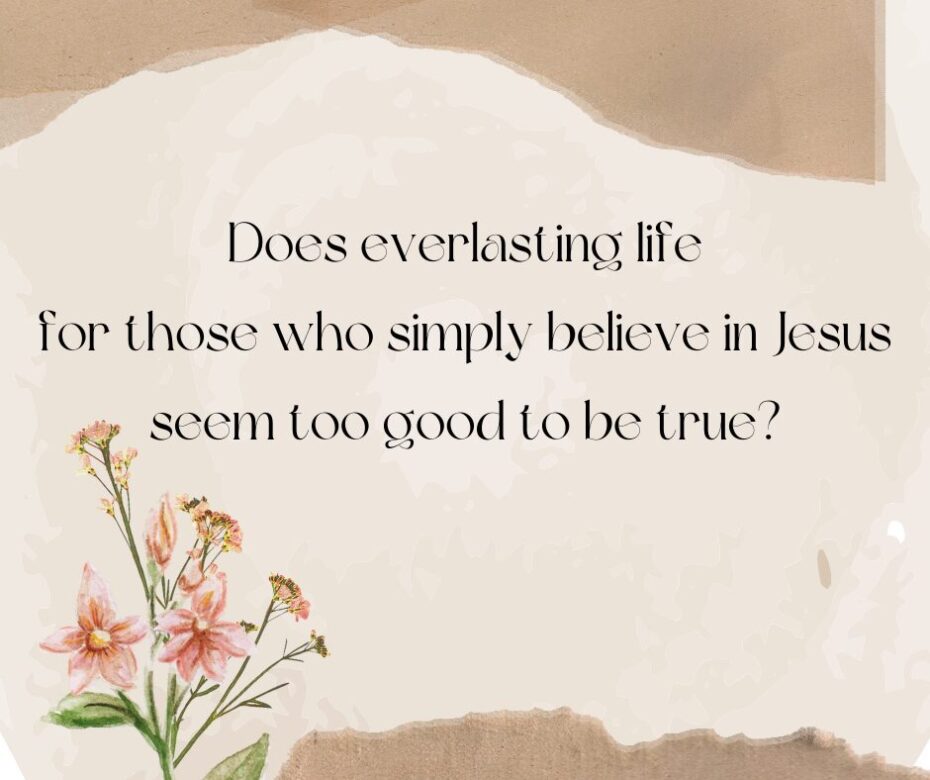One of my seminary professors and the person who ordained me, Dr. Charles Ryrie, famously quipped that if everlasting life could be lost, then it has the wrong name. There are various ways in which people who do not believe in eternal security get around Dr. Ryrie’s objection.
Here are two common ways: 1) Everlasting life is everlasting but can be lost up until we die. In this view, everlasting life is a commodity, like a car. The fact that you have it does not guarantee you will keep it. Even an everlasting commodity can be lost and given to someone else. 2) Everlasting life does not begin until we die. At the moment of faith, we gain initial salvation. If we persevere in faith and good works, then we will gain final salvation, also called everlasting life.i
So, how do we know that everlasting life is everlasting, that it can’t be lost, and that it begins the moment we believe in Jesus?
In the first place, the expression everlasting life (zōēn aiōnion) means “life without end.” The leading NT Greek dictionary says that the word translated as everlasting (aiōnion) means one of three things: (1) “long ago, before time began,” (2) “pertaining to a time without beginning or end, eternal,” and (3) “pertaining to a period of unending duration, without end.” In the context of believing in Christ, it means category three–life, unending. That is why it is better to speak of everlasting life than eternal life. Unlike God, our life does not extend eternally into the past. It began when we first believed in Jesus for everlasting life.
In the second place, the contexts in which this word occurs prove it refers to life that cannot be lost. Consider three example verses from John’s Gospel:
John 4:14. The Lord said, “but whoever drinks of the water that I shall give him will never thirst. But the water that I shall give him will become in him a fountain of water springing up into everlasting life.” The woman at the well understood that He was speaking of something permanent: “Sir, give me this water, that I may not thirst, nor come here to draw” (John 4:15).
John 5:24. Jesus said, “Most assuredly, I say to you, he who hears My word and believes in Him who sent Me has everlasting life, and shall not come into judgment, but has passed from death into life.” There is no future judgment to determine the eternal destiny of believers. Once we believe, we have everlasting life, we will never be judged regarding everlasting life, and we’ve already passed from death into life.
John 11:26. Jesus said, “He who lives and believes in Me shall never die.” That is what He, the Life, promises the believer. The believer will never die spiritually.
Scores of verses in John’s Gospel refer to everlasting life as a present possession, not something one will get at some future point if he perseveres.ii
Anyone who believes the promise of life knows, at that moment, that he has everlasting life that can never be lost. As long as he continues to believe that he retains assurance. And while assurance can be lost by taking our eyes off the promise, everlasting life cannot.
People reject the irrevocability of everlasting life because of tradition and human reasoning. It just doesn’t make sense to many that we could be secure simply through a moment of faith in Christ. And their church tradition rejects the irrevocability of everlasting life.
Sadly, instead of basing their understanding of everlasting life on John 3:16, many people rely on a faulty interpretation of Jas 2:14-26. Instead of turning to John 5:24, they turn to a faulty understanding of Heb 6:4-8. They then misunderstand John 3:16 and John 5:24 by reading their faulty theology into those verses. Faith in Christ is transformed into turning from sins, commitment, and following Christ.
God is a rewarder of those who diligently seek Him (Heb 11:6), of those who are willing to believe in Jesus (John 5:39-40), and of those open to the gift of life (Acts 13:48). If everlasting life for those who simply believe in Jesus seems too good to be true, how about praying about it and reading the Gospel of John? God will show you the truth if you prayerfully seek it out (Matt 7:7-11).
Keep grace in focus.
__________
i In a Video Study of James by Drs. Blomberg and Kamell Kovalishyn, Dr. Blomberg said concerning Jas 1:21: “We need to do it [receive the word] in humility. Verse 21 also refers to the manner of accepting this word which can save us, as consistently in James, to the final goal of salvation: eternal life with Jesus after this life is over.”
i iThere are a few references to everlasting life as a possible future reward. See Matt 19:29; John 4:36; Gal 6:8; 1 Tim 6:12, 19. There is a possible fullness of everlasting life that can be obtained at the Judgment Seat of Christ. Those texts do not in any way undo the promises concerning the irrevocability of the present possession of everlasting life.


